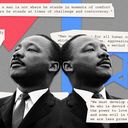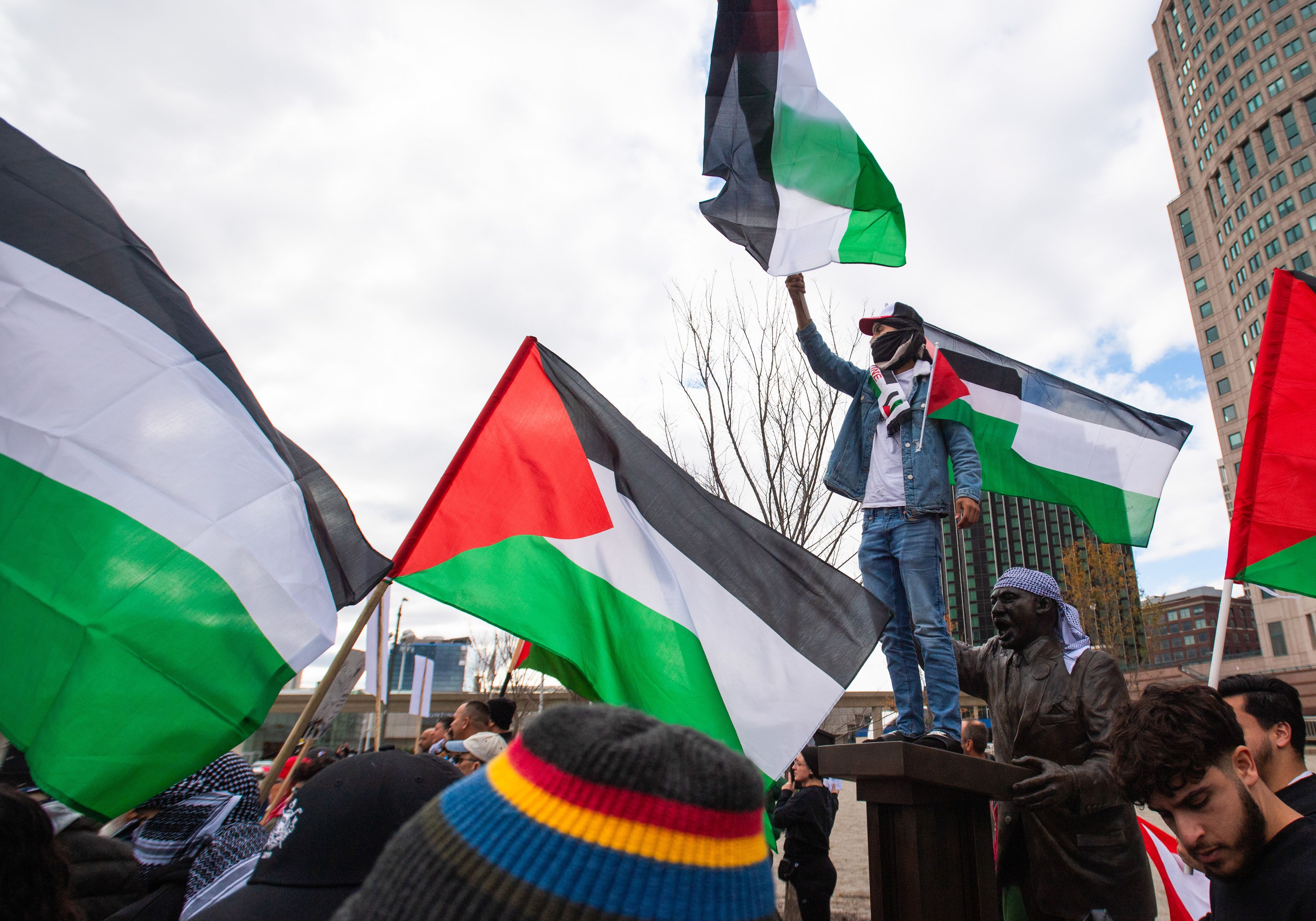MLK's words resonate with both sides of Israeli-Palestinian conflict

The Rev. Martin Luther King Jr. spoke in support of Israel and against militarism as he became a leader of America's Civil Rights Movement. Today, with the Middle East in turmoil, both sides of the Israeli-Palestinian conflict say his remarks show that he'd favor them.
Why it matters: King's words from the middle of the 20th century often are cited to bolster contemporary political positions without historical context — and debates about the Middle East are no different.
Catch up quick: Almost immediately after the Oct. 7 Hamas attack on Israel, supporters of Israel pointed to King's words expressing support for the Jewish nation.
- Actor Amy Schumer posted on X (formerly known as Twitter) a video of King saying Israel had a right to exist and speaking out against antisemitism.
- Israel "is one of the great outposts of democracy in the world," King said in the widely shared video.
The other side: Supporters of Palestinians, meanwhile, have pointed to speeches King gave against violence, the Vietnam War and military action on oppressed people as evidence that he would have opposed Israel's bombing of Gaza.
- Demonstrators supporting the Palestinian territories have staged civil disobedience marches to urge for a ceasefire, holding posters with MLK quotes. A demonstration is scheduled today in New York City to mark Martin Luther King Day.

Zoom in: King visited Israel, endorsed Israel's right to exist and expressed support for a "Marshall Plan for the Middle East" to combat poverty among Arab people.
- "Peace for Israel means security. The world and all people of good will must respect the territorial integrity of Israel," King said on ABC's "Issues and Answers" show in June 1967, according to a transcript at the King Center. Those comments didn't make it to the edited show that aired.
- "We must also see that Israel is there, and any talk of driving the Jews into the Mediterranean ... is not only unrealistic talk, but it is suicidal talk for the whole world and I think also it is terribly immoral."
- King added that Israel should give up conquered territory to avoid exacerbating tensions and deepening the bitterness among Arabs.
Yes, but: King was speaking of a world that he saw in the 1950s and 1960s, not 2024, Hajar Yazdiha, author of "The Struggle for the People's King: How Politics Transforms the Memory of the Civil Rights Movement," tells Axios.
- U.S. military aid to Israel then was not nearly what it is now, Yazdiha said.
- Much also has happened in the region and world during the past 60 years, from the Oslo Accords to the rise of global terrorist networks, said Martin Kramer, a historian of the Middle East at Tel Aviv University.
- "It's impossible to know what he would have thought today," Kramer said of King, who was 39 when he was assassinated in 1968.
Between the lines: King had many Jewish advisers, and many rabbis risked their lives to march with him during the Civil Rights Movement, Yazdiha said.
- "At the time when he's thinking about Israel as a space for the self-determination of an oppressed people, he's comparing it to Black Americans."
What they're saying: "First and foremost, he always was for nonviolence. So I can be sure that he would be for a ceasefire" in Gaza today, King's son, Martin Luther King III, tells Axios.
- "I don't know the answer to the Middle East. What I do know is that my father would be for the support of all humanity, whatever that looks like. And today, it does not look like humanity is existing in an appropriate way in the Middle East."
In 1959, King gave a sermon at Dexter Avenue Baptist Church in Montgomery, Ala., in which he recalled a recent visit to Jerusalem.
- He spoke of "the ancient city of God" being divided by "man's hate and his evil" because of the Arab-Israeli conflict. King also said he saw "people of all races and of all cultures" mingling, despite the tensions.
- "I think if more of our white brothers in the South had traveled a little more" to cities like Jerusalem, "many of our problems would be solved today," he said.